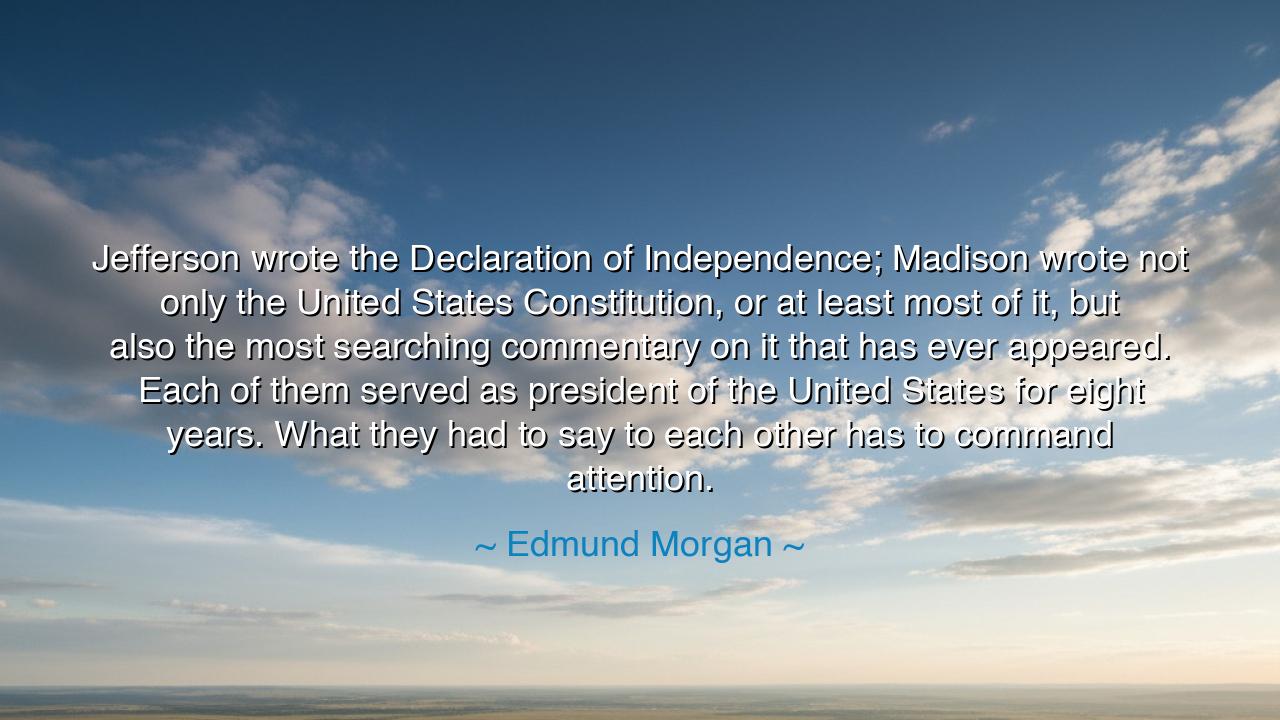
Jefferson wrote the Declaration of Independence; Madison wrote
Jefferson wrote the Declaration of Independence; Madison wrote not only the United States Constitution, or at least most of it, but also the most searching commentary on it that has ever appeared. Each of them served as president of the United States for eight years. What they had to say to each other has to command attention.






The words of Edmund Morgan, in praising Jefferson and Madison, are not merely the record of two great men, but a hymn to the birth of a nation and the spirit of human liberty. When he says, “Jefferson wrote the Declaration of Independence; Madison wrote not only the United States Constitution, or at least most of it, but also the most searching commentary on it that has ever appeared. Each of them served as president of the United States for eight years. What they had to say to each other has to command attention,” he speaks not only of two founders, but of the eternal dialogue between vision and structure, dream and law, freedom and order. These men—one the pen of revolution, the other the architect of endurance—stand as pillars of the same temple.
Jefferson’s hand carved the first flame, proclaiming that all men are created equal, that governments are the servants, not the masters, of the people. His words were thunder and lightning—a clarion call to the conscience of the world. But thunder fades if no hearth is built to hold its fire. Madison, quieter yet deeper, shaped the Constitution, giving bones and sinew to Jefferson’s spirit. He wrote not for the moment but for the ages, crafting a government both flexible and firm, able to bend with time yet anchored in principle. Morgan’s quote reminds us that these two did not merely live in the same age—they completed each other’s work.
In the letters exchanged between Jefferson and Madison, we witness the conversation of two minds bound by destiny. Jefferson’s idealism soared to the heavens, envisioning a republic of virtuous citizens and boundless opportunity. Madison’s mind, tempered by caution, drew the maps that would keep the republic from tearing itself apart. One dreamed the stars, the other charted the constellations. And together, they created something neither could have achieved alone: a balance between liberty and law, between the rights of man and the restraints of power.
Consider the tale of their collaboration on the Virginia Statute for Religious Freedom. Jefferson, while away in France, left the draft behind; Madison, steadfast at home, shepherded it through the storm of politics until it passed. Thus, one conceived, the other completed. It was the rhythm of their lives: Jefferson sowed the seeds, Madison tended the soil. The fruit was not for their time alone, but for ours—for every generation that must learn again that freedom is born not from impulse but from wisdom, not from chaos but from deliberation.
When Morgan tells us that “what they had to say to each other has to command attention,” he is calling us to listen—to hear in their dialogue the eternal struggle of humanity: how to be free, yet governed; how to be many, yet one. Their correspondence, their debates, their shared reverence for the people—all speak to a truth as old as civilization itself: that liberty without order is anarchy, and order without liberty is tyranny. To read their words is to gaze into the very workshop of democracy.
So too, in our own age, must we learn to unite the heart of Jefferson with the mind of Madison. The dreamers among us must not scorn the architects; the builders must not silence the poets. Every great endeavor—whether the founding of a nation or the creation of a new idea—requires both. The spirit that declares, “This shall be!” and the wisdom that whispers, “This is how it shall endure.”
The lesson, then, is simple yet sacred: seek harmony between passion and reason. Speak boldly like Jefferson, but plan wisely like Madison. Do not fear idealism, but give it a framework. Do not worship structure, but fill it with soul. Let your words ignite hearts, and your deeds sustain them. For in the end, as with those two mighty men, your legacy will not be measured by what you dream alone, but by what you build that lasts.
Thus, to those who listen: write your own Declaration with courage, but also your Constitution with care. And when you find another whose mind complements your own—cherish that partnership, for such unions shape the destiny of the world.






AAdministratorAdministrator
Welcome, honored guests. Please leave a comment, we will respond soon